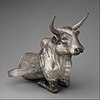Mysians

Mysians/ˈmiːʒənz,ˈmɪʒənz/(Latin:Mysi;Ancient Greek:Μυσοί,Mysoí) were the inhabitants ofMysia,a region in northwesternAsia Minor.
Origins according to ancient authors
[edit]Their first mention is byHomer,in his list ofTrojansallies in theIliad,and according to whom the Mysians fought in theTrojan Waron the side ofTroy,under the command of Chromis andEnnomustheAugur,and werelion-hearted spearmen who fought with their bare hands.[1]
Herodotusin hisHistorieswrote that the Mysians were brethren of theCariansand theLydians,originally Lydian colonists in their country, and as such, they had the right to worship alongside their relative nations in the sanctuary dedicated to theCarian ZeusinMylasa.[2]He also mentions a movement of Mysians and associated peoples fromAsiaintoEuropestill earlier than the Trojan War, wherein the Mysians andTeucrianshad crossed theBosphorusinto Europe and, after conquering all ofThrace,pressed forward till they came to theIonian Sea,while southward they reached as far as the riverPeneus.[3]Herodotus adds an account and description of later Mysians who fought inDarius' army.
Straboin hisGeographicainforms that, according to his sources, the Mysians in accordance with their religion abstained from eating any living thing, including from their flocks, and that they used as food honey and milk and cheese.[4]Citing the historianXanthus,he also reports that the name of the people was derived from the Lydian name for theoxya tree.
Mysian language
[edit]Little is known about theMysian language.Strabo noted that their language was, in a way, a mixture of theLydianandPhrygian languages.As such, the Mysian language could be a language of theAnatolian group.However, a passage inAthenaeussuggests that the Mysian language was akin to the barely attestedPaeonian languageofPaeonia,north ofMacedon.
A short inscription which could be in Mysian and which dates from between the 5th and 3rd centuries BC was found inÜyücek,nearKütahya,and seems to includeIndo-Europeanwords, but it has not been deciphered.[5]

